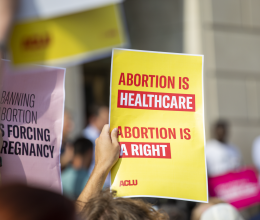Two major wins were scored for abortion access last week. On Friday, a federal judge in Austin blocked the portion of Texas’s HB2 that would require all abortion clinics to meet the building, equipment, and staffing standards of a hospital surgery center. And on Sunday, a federal judge temporarily blocked a new abortion law in Louisiana that would require doctors to have admitting privileges at a hospital within 30 miles of their clinic. This good news rounds off a month of good news in the world of reproductive rights. For a quick reminder about other wins in the past month, see my blog posts about Mississippi and Alabama.
In his 21-page ruling, Judge Lee Yeakel of the U.S. District Court in Austin declared a key provision of HB2 unconstitutional because it would impose “an undue burden on the right of women throughout Texas to seek a pre-viability abortion.” The provision in question was a TRAP (Targeted Regulation of Abortion Providers) related rule that would require abortion clinics to meet the standards of ambulatory surgical centers (ASCs). Making this conversion, which could include widening hallways and creating a sterile ventilation system, can cost millions of dollars to implement and thousands of dollars a month to maintain. This particular section of HB2’s requirements was slated to go in effect on Monday, September 1. The law would have closed all but 8 of Texas’s abortion clinics. If those clinics had closed, approximately 750,000 Texas women would have lived 200 or more miles from the nearest abortion provider. The remaining open clinics would have been located in larger cities, meaning that poor, rural women would bear the heavy burden of finding funds for transportation and lodging if they needed to seek an abortion.
In Louisiana, Judge John deGravelles of the state’s Middle District temporarily blocked a state law that would require physicians who perform abortions to have admitting privileges. HB 388, signed by Gov. Bobby Jindal in June, gave doctors 81 days to obtain the necessary admitting privileges. It can take anywhere from 90 days to seven months for a hospital to decide whether or not to grant admitting privileges. The Center for Reproductive Rights challenged the law, complaining that, because doctors weren’t given adequate time to obtain these privileges, all five of Louisiana’s clinics would end up closing. While the law may still go into effect, Judge deGravelles’s action will keep doctors from being penalized while the challenge is being heard. Abortion rights advocates are optimistic – an earlier ruling on a similar Alabama law gives people hope that the true purpose of these kinds of TRAP laws will be made apparent.
I’ve written about TRAP laws before. They are burdensome and unnecessary. A first trimester abortion is one of the safest medical procedures – less than .05% present major complications that might need hospital care. Laws that seek to regulate abortion in this unnecessary manner are not designed to keep women safe. They are designed to close clinics, keep doctors from performing abortions, and make abortion inaccessible.






